The Best VPN Services in 2025
We confidently rank ExpressVPN as one of the best VPNs worldwide, especially for users who want simple apps that unblock geo-restricted content across multiple devices. NordVPN is another strong contender, offering fast speeds and a variety of advanced security options. For those on a budget, Private Internet Access provides a more affordable VPN solution, particularly well-suited for anonymous torrenting.
If you're searching for a VPN to enhance your online privacy, security, or streaming experience, you’ve come to the right place. Here at Top10VPN, we provide honest and straightforward reviews.
Many tech sites and news outlets claim to extensively test VPNs, but often the top picks you see are influenced by commercial partnerships. This is why you’ll frequently find the same few VPNs recommended repeatedly.
Additionally, some review websites are owned by VPN companies themselves and serve as promotional platforms. On top of that, the VPN market is flooded with low-quality services that can jeopardize your security and privacy.
In our tests, 88% of popular free VPNs showed serious security flaws, including leaking users’ real IP addresses. Even paid VPNs have vulnerabilities, with 53% of Android apps leaking minor user data.
Therefore, we strongly recommend doing thorough research and trusting independent experts with proven knowledge in VPN technology.
What Exactly Is a VPN?
Simple Explanation
Using the internet without a VPN is like sending a postcard—anyone handling it, such as postal workers, can read the message and see both your home address and recipient’s address.
On the internet, these “postal workers” are your ISP, hackers, or others on the same public WiFi network.
A VPN makes your online activity more like sending a sealed envelope with encrypted messages that only the intended recipient can read.
Here’s how a VPN works when you visit a website:
Encryption: Your message is sealed in an envelope and written in code that only the recipient can understand. If anyone else opens it, the message remains unreadable.
Secure Tunnel: Instead of sending it via regular mail routes, the envelope travels through a secure courier service that avoids potentially compromised routes.
IP Masking: The courier replaces your return address with its own, hiding your true location and identity from the website.
Technical Overview
A VPN establishes an encrypted tunnel between your device and a VPN server using standard protocols like OpenVPN or WireGuard.
Your data is encrypted locally before traveling through this tunnel. The VPN server acts as a proxy, making requests on your behalf using its IP address.
Strong encryption methods such as AES-256 or ChaCha20 protect your data, with secure key exchanges like RSA-2048.
Even if attackers intercept the data, they only see encrypted information, not your actual traffic.
When you connect to a site via VPN:
Your traffic is encrypted by the VPN client on your device.
It’s routed through the secure tunnel to the VPN server.
The VPN server decrypts the traffic and forwards it to the website.
The return traffic takes the reverse path back to your device.
This process masks your IP address and DNS queries, making websites see the VPN server location instead of your real one.
VPN Comparison & Reviews
Below are some top VPNs that meet a wide range of needs. Take your time to compare features carefully before making a choice.
You can quickly review our top 10 VPN picks in the comparison table below:
| ExpressVPN | NordVPN | PIA VPN | Surfshark | IPVanish | Proton VPN | CyberGhost | PrivateVPN | Hide me | Windscribe | ||
|---|---|---|---|---|---|---|---|---|---|---|---|
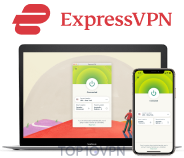 | 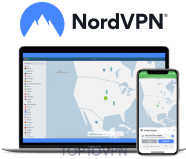 | 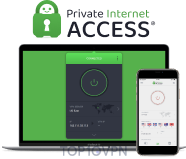 | 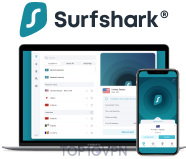 | 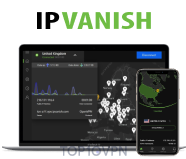 | 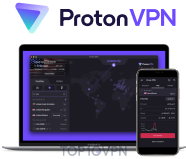 |  | 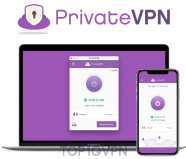 | 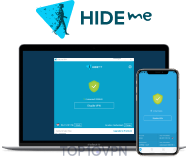 | 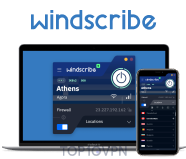 | ||
| Overall Rating | 9.3/10 | 9.1/10 | 9.0/10 | 8.8/10 | 8.7/10 | 8.3/10 | 8.2/10 | 8.2/10 | 8.2/10 | 8.1/10 | |
| Overall Rating | 9.3/10 | 9.1/10 | 9.0/10 | 8.8/10 | 8.7/10 | 8.3/10 | 8.2/10 | 8.2/10 | 8.2/10 | 8.9 | |
| Privacy | 9.2 | 8.8 | 9.7 | 8.7 | 8.8 | 9.5 | 8.6 | 9.3 | 8.9 | 8.9 | |
| Speed | 9.7 | 9.7 | 9.7 | 9.1 | 9.8 | 8.6 | 8.5 | 9.1 | 9.8 | 9.3 | |
| Security | 8.6 | 9.1 | 9.3 | 8.3 | 8.5 | 9.8 | 7.3 | 7.0 | 8.5 | 7.2 | |
| Streaming | 9.9 | 9.2 | 6.1 | 9.0 | 8.9 | 5.2 | 7.5 | 8.2 | 8.0 | 8.6 | |
| User Experience | 9.9 | 9.3 | 9.5 | 8.5 | 8.1 | 7.8 | 8.1 | 8.5 | 7.0 | 7.0 | |
| Server Locations | 9.9 | 9.7 | 9.6 | 9.5 | 8.6 | 9.7 | 9.6 | 8.0 | 6.0 | 6.7 | |
| Torrenting | 9.3 | 9.0 | 9.7 | 8.6 | 9.2 | 9.2 | 8.6 | 9.1 | 9.0 | 8.5 | |
| Additional Features | 6.4 | 7.6 | 7.7 | 8.3 | 6.3 | 5.9 | 6.9 | 4.5 | 7.7 | 7.1 | |
| Device Compatibility | 9.9 | 8.9 | 9.5 | 9.1 | 8.0 | 7.9 | 8.3 | 6.3 | 7.5 | 8.6 | |
| Price | $4.99/mo over 28 months | $2.99/mo over 27 months | $2.03/mo over 28 months | $1.99/mo over 28 months | $2.19/mo over 24 months | $4.99/mo over 24 months | $2.03/mo over 28 months | $2.00/mo over 36 months | $2.69/mo over 26 months | $5.75/mo over 12 months | |
| Official Website | expressvpn.com | nordvpn.com | piavpn.com | surfshark.com | ipvanish.com | protonvpn.com | cyberghost.com | privatevpn.com | hide.me |
Summary: Our Top 10 VPN Rankings
ExpressVPN: The best overall VPN
NordVPN: Top runner-up choice
Private Internet Access: Best budget-friendly VPN
Surfshark: Affordable VPN packed with extra features
IPVanish: Excellent for Fire TV Stick users
Proton VPN: Best fully free and secure VPN
CyberGhost: Best VPN free trial offer
PrivateVPN: Great affordable option for beginners
Hide.me: Effective at bypassing internet firewalls
Windscribe: Unblocks the widest range of Netflix regions
ExpressVPN: The best overall VPN
Pricey, but Worth Every Penny
ExpressVPN isn’t flawless, and its biggest downside is the relatively high subscription cost. Even on its most affordable plan, it’s priced at $4.99/month for a 28-month subscription.
However, the premium price comes with top-tier performance and features that justify the investment.
For those who prefer to test it out before committing, ExpressVPN also provides free trials of 7 and 30 days.
An Exceptionally Easy-to-Use & Flexible VPN
ExpressVPN stands out as one of the simplest and most broadly compatible VPNs we’ve tried. It’s about as close to plug-and-play as VPNs get.
From the very first launch, all essential settings are already configured for you, including Automatic Protocol Selection for optimal performance and an active VPN kill switch.
Every app—router version included—is thoughtfully designed, clutter-free, and consistent across all platforms.
The red, green, and white color scheme works seamlessly on any device screen, ensuring that labels are easy to see and read.
A VPN That Prioritizes Your Security
ExpressVPN excelled in our security and privacy evaluations.
It channels your data through secure protocols—OpenVPN and Lightway 2.0—paired with AES-256 encryption and diskless (RAM-only) servers, ensuring it’s physically incapable of storing activity logs.
This isn’t just a claim—real-world incidents, such as server seizures, along with multiple independent audits, have consistently verified it.
While ExpressVPN skips certain extras like multi-hop routing or GPS spoofing, it covers all the essential protections, including a reliable VPN kill switch that blocks sudden IP leaks.
Outstanding for Streaming Geo-Blocked Content
After thousands of streaming tests, ExpressVPN continues to dominate as the top VPN for streaming, successfully unblocking 95% of the platforms we tested.
Its unmatched ability to access geo-restricted content in 106 countries—combined with consistently fast streaming speeds—sets it apart from competitors.
Recent testing has shown notable improvements in matching server locations to their actual geolocations, making it even more effective at bypassing the toughest restrictions.
ExpressVPN’s US servers are especially strong, effortlessly unblocking HBO Max, Disney+, and Amazon Prime Video. With coverage in 57 US cities, they also bypass NFL out-of-market restrictions and other sports blackouts with ease.
Here are the servers we recently tested for unblocking major content libraries:
US content: New Jersey – 1
Australian content: Australia – Melbourne
British content: UK – Docklands
Canadian content: Canada – Toronto
Indian content: India (via Singapore)
Japanese content: Japan – Tokyo
It’s not just the best VPN for US Netflix—where it scored a flawless 100% reliability—but it also unlocks 17 other Netflix regions, including Australia, Canada, India, and the UK.
The ExpressVPN Chrome extension unblocks more streaming platforms than any other VPN we’ve tested.
We’ve also seen a big leap in its ability to beat UK geo-restrictions. Previously inconsistent, it’s now our go-to for watching Sky Go abroad.
On TV devices, we enjoyed its intuitive Fire TV app and the MediaStreamer (Smart DNS) feature for unblocking apps on Smart TVs and gaming consoles.
That said, streaming performance isn’t perfect—occasionally a server will stop working with a platform. In those cases, switching to another server in the same country usually solved the issue. If not, ExpressVPN’s 24/7 live chat team responded in seconds, and their recommended servers almost always worked.

| Pricing Plans | $12.95 / month $6.25 / month (16 months) $4.99 / month (28 months) |
| Local Download Speed | 85 Mbps (15% loss) |
| Logging Policy | No identifiable data |
| Countries with Servers | 106 |
| Total Servers | 13,360 |
| Jurisdiction | British Virgin Islands (privacy-friendly) |
| Simultaneous Connections | 8 |
| Compatible With | Windows, macOS, iOS, Android, Linux, Amazon Fire TV, Android TV, Apple TV, Router, Chrome |
While many review sites now place NordVPN in the top spot, ExpressVPN remains our #1 choice because it consistently delivers outstanding results in nearly every test we run.
Although its subscription cost is higher than most competitors, its exceptional user-friendliness and versatility make it worth the price—perfect for almost any online need.
We were particularly impressed by ExpressVPN’s excellent speeds, intuitive interface, and reliable ability to unblock the majority of websites and apps on our test devices.
NordVPN: Top runner-up choice
Not as User-Friendly as ExpressVPN
Although we rate NordVPN highly, we were somewhat disappointed by its less intuitive and user-friendly apps.
The Mac and Windows versions especially could use design improvements. While not difficult to use, their interfaces feel cluttered due to the abundance of extra features.
Minimal Speed Loss Worldwide
NordVPN consistently delivers very fast speeds. On same-country connections, it only slowed down by 4%, nearly matching ExpressVPN’s 2% reduction.
For international connections, NordVPN performed on par with ExpressVPN, averaging 86 Mbps on a fixed 100 Mbps baseline.
In some specific locations, NordVPN actually outpaced ExpressVPN. Its UK and Canadian servers offered excellent speeds and reliably unblocked local TV services.
Exceptional Security Standards & Features
One thing we really appreciate about NordVPN is how much it has enhanced its security since a minor server breach in 2018.
All its apps now use NordLynx, a version of the WireGuard protocol, and encrypt traffic with the ChaCha20 cipher.
We verified the encryption ourselves by analyzing network packets with Wireshark, which showed our traffic was completely unreadable.
Along with a mandatory kill switch that passed our penetration tests, NordVPN offers a rare multi-hop (double VPN) feature that routes traffic through two separate VPN servers, encrypting it twice for extra security.
Like ExpressVPN, NordVPN operates on RAM-only (diskless) servers, making it nearly impossible for third parties to retrieve user data.
NordVPN maintains a strict no-logs policy—it does not record your IP address, browsing history, or bandwidth usage.
However, it does temporarily log your username and last connection time for 15 minutes after each session.
While we trust NordVPN’s privacy claims, they have yet to be conclusively proven through a public court case or law enforcement inquiry.

| Pricing Plans | $12.99 / month $4.59 / month (15 months) $2.99 / month (27 months) |
| Local Download Speed | 86 Mbps (14% loss) |
| Logging Policy | No identifiable data |
| Countries with Servers | 125 |
| Total Servers | 7,898 |
| Jurisdiction | Panama (privacy-friendly) |
| Simultaneous Connections | 10 |
| Compatible With | Windows, macOS, iOS, Android, Linux, Amazon Fire TV, Android TV, Apple TV, Router, Chrome |
NordVPN is nearly as good as ExpressVPN and arguably more popular, thanks in part to its extensive advertising campaigns.
It stands out as a strong VPN due to its excellent security features, fast speeds, and variety of extras, though its usability and unblocking capabilities fall just short of ExpressVPN’s.
Many review sites may not highlight this, but ExpressVPN is a more well-rounded VPN, outperforming NordVPN in 70% of our test categories.
That said, NordVPN is significantly cheaper than ExpressVPN on a two-year plan, which can be a key deciding factor for budget-conscious users.
Private Internet Access: Best budget-friendly VPN
App Usability Needs Improvement
While PIA excels in privacy and torrenting, and offers a very attractive subscription price, its software usability leaves much to be desired.
Simply put, PIA isn’t as well-designed or beginner-friendly as ExpressVPN. There are too many settings to navigate, which can overwhelm typical VPN users.
The macOS app was particularly frustrating, taking over three seconds just to load as a windowed app.
Other usability issues included 75% of US server locations failing to work with streaming apps on Firestick, and the Smart DNS feature not unblocking any services.
On the bright side, PIA’s mobile apps are probably the most visually appealing and user-friendly among its offerings.
Rare Server Coverage Across All 50 US States
PIA not only owns one of the largest VPN server networks in the industry, but it’s also one of only two VPNs—alongside ExpressVPN—to offer servers in every US state.
Having access to such a vast pool of American IP addresses made it easy for us to bypass US sports blackouts and stream local TV broadcasts without issue.
No-Logs VPN Excellent for Torrenting
Very few VPNs on the market have verified no-logs policies, but Private Internet Access (PIA) is one of the exceptions.
Its logging policy has been independently audited multiple times, and the company regularly publishes transparency reports to reinforce this commitment.
Additionally, all of PIA’s apps are open source, providing an extra layer of transparency and trustworthiness.
Thanks to its strict no-logs policy and strong security features, PIA outperformed many competitors in anonymous torrenting.
During our tests, we were able to torrent on all of PIA’s servers—including those in the US—something many VPNs restrict without clear reasons.
Unlike most VPNs, PIA also supports VPN port forwarding, which helps increase the number of peers you connect with, boosting torrent speeds.
Using qBittorrent, we achieved download speeds of 9.6 MiB/s—faster than both ExpressVPN and NordVPN.

| Pricing Plans | $11.99 / month $7.50 / month (6 months) $2.03 / month (28 months) |
| Local Download Speed | 86 Mbps (14% loss) |
| Logging Policy | No Logs |
| Countries with Servers | 91 |
| Total Servers | 18,651 |
| Jurisdiction | US (Five Eyes Member) |
| Simultaneous Connections | Unlimited |
| Compatible With | Windows, macOS, iOS, Android, Linux, Amazon Fire TV, Android TV, Apple TV, Router, Chrome |
Private Internet Access (PIA) performed exceptionally well in many of our tests, coming close to surpassing NordVPN. If you’re looking for an affordable no-logs VPN, PIA is likely a great choice.
With access to over 18,651 servers, you can use PIA confidently knowing your IP address and browsing activity remain completely private—all for just $2.03 per month on a 28-month plan.
While PIA’s apps aren’t as polished as ExpressVPN’s, and we don’t recommend it for streaming on Smart TVs, it remains an excellent budget-friendly VPN worth serious consideration.
Surfshark: Affordable VPN packed with extra features
Slow Server Connections & Moderate Speeds
Our main issues with Surfshark stem from its slow server connection times and moderate speeds across all apps.
We often had to wait several seconds to connect to popular servers. Once connected, speeds were noticeably slower than those of ExpressVPN or NordVPN.
For example, on short-distance connections, our speed dropped by 4%—which isn’t terrible but is still worse than ExpressVPN’s 2% loss.
On longer-distance connections, the slowdowns were even more significant.
Rare Ability to Spoof GPS Data
Surfshark offers a rare feature that lets you spoof your GPS location on Android devices—something only Windscribe also provides.
The “GPS Override” function stops Android apps from detecting your real location by GPS. It’s easy to use and works exactly as intended.
When enabled, this feature successfully spoofed our GPS coordinates on an Android device to match the VPN server location.
This capability helps Surfshark bypass geo-restrictions on apps that rely on GPS data, like ESPN+. Neither ExpressVPN nor NordVPN currently offer this technology.
Many Settings for Added Security & Privacy
Surfshark provides strong security, offering many essential features expected from top-tier VPN providers.
All its apps use ChaCha20 encryption, WireGuard as the default protocol, and include a VPN kill switch.
One minor concern is that the kill switch isn’t enabled by default, though it can be easily activated in the settings. On macOS, we noticed the kill switch leaked our IP address briefly when switching servers.
On the plus side, Surfshark logs almost no user data. Like ExpressVPN, its servers run on RAM-only technology, making data extraction impossible in case of breaches or seizures.
Additionally, Surfshark offers a ‘Rotating IP’ feature that changes your IP address every five to ten minutes without switching servers.
We tested this function on iOS, and it worked smoothly, further enhancing your anonymity and security without ever exposing your real location.

| Pricing Plans | $15.45 / month $2.99 / month (16 months) $1.99 / month (28 months) |
| Local Download Speed | 83 Mbps (17% loss) |
| Logging Policy | No Identifiable Data |
| Countries with Servers | 100 |
| Total Servers | 3,200 |
| Jurisdiction | Netherlands (EU Member) |
| Simultaneous Connections | Unlimited |
| Compatible With | Windows, macOS, iOS, Android, Linux, Amazon Fire TV, Android TV, Apple TV, Router, Chrome |
Surfshark offers serious competition to the top VPNs—all at an incredibly low price of just $1.99 per month on a 28-month plan.
Despite its affordability, it boasts strong security credentials, an independently audited no-logs policy, and features like GPS spoofing, multi-hop servers, and rotating IP addresses.
Surfshark’s apps are relatively user-friendly, making it easy to select server locations, switch protocols, and customize security settings.
However, there are some drawbacks. Speeds drop noticeably on long-distance connections, we experienced occasional IPv6 leaks, and the kill switch is disabled by default—a surprising oversight in our view.
IPVanish: Excellent for Fire TV Stick users
Device Compatibility Is an Issue
IPVanish’s Fire TV app works well, but overall, its applications—especially for desktop—suffer from outdated design.
Even after a 2023 redesign, the Windows and macOS apps still don’t look as clean or user-friendly as ExpressVPN’s.
The home screens feel cluttered, with a prominent data waveform and map that don’t add enough value to justify the space they occupy.
IPVanish truly excels at keeping internet data transfers private.
All 2,400 physical servers, which are fully owned by IPVanish, operate under a strict no-logs policy—they do not monitor or store any internet activity.
Additionally, users gain access to over 40,000 anonymous IP addresses, an impressive number that is rare among VPN providers.
The IPVanish server network is both large and self-owned.
In our security tests, we did not experience any IP or DNS leaks while using IPVanish, except when switching servers on the Mac app—a minor but important issue that the company should address.
The IPVanish app includes a VPN kill switch; however, it is not enabled by default.
This is reportedly to prevent new users from accidentally losing internet access by running the app without an active VPN connection.
The kill switch toggle is clearly visible on the app’s home screen and remains active once turned on.
While this is a reasonable compromise, we still prefer VPN kill switches to be enabled by default, as it is the safest approach.
A Top Choice for Fire TV Devices
IPVanish continues to be our top-rated VPN for the widely used Amazon Fire TV Stick and other Fire TV devices.
The app is user-friendly and delivers fast connection speeds to nearby VPN servers. In recent tests, we observed only a 4% decrease in download speeds.
We also discovered that the VPN performs reliably with Kodi and IPTV applications.
However, a drawback of IPVanish is that it may sometimes struggle to unblock certain local streaming services. While it works excellently with Netflix, Hulu, and Max, it can be less effective with apps like RTL+ and Kayo Sports.

| Pricing Plans | $12.99/mo $2.79/mo (12 mo) $2.19/mo (24 mo) | ||
|---|---|---|---|
| Local Download Speed | 88 Mbps (12% loss) | ||
| Logging Policy | No Logs | ||
| Countries with Servers | 107 | ||
| Servers | 2,400 | ||
| Jurisdiction | US (Five Eyes Member) | ||
| Simultaneous Connections | Unlimited | ||
| Compatible with | Windows, Mac, iOS, Android, Linux, Amazon Fire TV, Android TV, Apple TV, Router, Chrome |
IPVanish’s standout feature is its VPN app designed specifically for the Fire TV Stick. It offers fast performance and maintains a strict no-logs policy for streaming.
Thanks to its strong security measures and commitment to privacy, IPVanish is especially well-suited for anonymous streaming on Kodi and IPTV apps.
However, IPVanish would rank higher if not for two main drawbacks: its apps are less user-friendly than we’d prefer, and it doesn’t offer popular extras like Smart DNS or dedicated IP addresses.
Proton VPN: Best fully free and secure VPN
Speeds Have Declined
Although Proton VPN remains fast, its paid version has noticeably fallen behind key competitors in our latest speed tests, which came as a surprising development.
Even with WireGuard enabled, its local download speeds are consistently slower than those of ExpressVPN, NordVPN, PIA, IPVanish, and several other providers.
We observed a slowdown in speeds when connecting to both nearby and distant VPN servers. The exact cause of this decline is unclear, but it is definitely impacting the VPN’s overall performance.
While Proton VPN is generally a solid service, it unfortunately doesn’t offer as much value for money compared to the higher-ranked VPNs.
Strong Encryption & Robust Security Features
Proton VPN is well-known for providing highly secure and encrypted VPN connections.
Users can choose between OpenVPN or WireGuard protocols, which means connections are protected with AES-256 or ChaCha20 encryption, and Forward Secrecy (FS) is enforced for added security.
The paid plan also offers Secure Core technology, available on 40 servers, which boosts security by routing traffic through Proton VPN’s own data centers.
Despite these advanced security measures, Proton VPN remains user-friendly. Its apps have an attractive design across all platforms, and even the most sophisticated features are straightforward to use.
Top-Rated Free VPN Option
Proton VPN’s free app stands out as the best free VPN available, largely due to its unlimited bandwidth that lets you keep it running continuously.
In our recent tests, it delivered impressive speeds across all 5 free server locations, with only a 7% average speed loss—outperforming some paid VPNs!
However, the free plan’s 5 server locations feel very limited compared to the 117 servers offered on the paid plan.
What was particularly frustrating is that you can no longer select a specific free server location; instead, you’re automatically connected to the nearest server in the US, Netherlands, Japan, Romania, or Poland.
Adding to the drawbacks, these free servers block all P2P traffic and restrict access to geo-blocked content, as our tests confirmed. For torrenting and streaming, Windscribe is a far better alternative.

| Pricing Plans | $9.99/mo $5.99/mo (12 mo) $4.99/mo (24 mo) | ||
|---|---|---|---|
| Local Download Speed | 84 Mbps (16% loss) | ||
| Logging Policy | No Logs | ||
| Countries with Servers | 117 | ||
| Servers | 13,124 | ||
| Jurisdiction | Switzerland (Privacy Haven) | ||
| Simultaneous Connections | 10 | ||
| Compatible with | Windows, Mac, iOS, Android, Linux, Amazon Fire TV, Android TV, Apple TV, Router, Chrome |
Proton VPN is a comprehensive service, offered both as a free and paid option. Its free version stands out as the best free VPN we’ve tested, while the paid plan excels in security features.
All Proton VPN apps are open-source, have undergone independent audits, don’t store session logs, and provide a user-friendly experience.
Although the paid version is on the pricier side, the free plan delivers excellent value: it’s completely secure, impressively fast, and offers unlimited bandwidth. However, it cannot bypass content geo-restrictions and blocks torrenting traffic.
CyberGhost: Best VPN free trial offer
Inconsistent International Speeds
A major downside of CyberGhost is its uneven performance when connecting to distant servers.
Its international download speed of 81Mbps lags behind ExpressVPN’s 85Mbps and NordVPN’s 86Mbps by a noticeable margin.
These international speed slowdowns have persisted for several years, with little sign of improvement so far.
Dedicated IPs Without Sacrificing Privacy
While CyberGhost’s features may not be as extensive as those of PIA or NordVPN, they adequately meet the needs of most users.
A standout offering is its dedicated IP service, providing single-user static IPs in Canada, France, Germany, the UK, and the US, available at an additional cost.
These dedicated IPs let you consistently use the same anonymous IP address. Thanks to a token-based system, your IP isn’t directly linked to your account, ensuring your online privacy remains protected.
Significantly Enhanced Streaming Performance
CyberGhost’s dedicated streaming servers have greatly improved their ability to unblock popular streaming platforms compared to before.
Previous inconsistencies have largely disappeared, and the VPN now reliably accesses major services such as Netflix (across 10 regions), Disney+, Prime Video, Hulu, and BBC iPlayer.
What really stood out during our tests was CyberGhost’s Smart DNS tool.
In our experience, it is the most effective DNS tool provided by any VPN, successfully unblocking content in countries like Germany, Japan, the Netherlands, the UK, and the US.
Moreover, the tool includes specific configurations tailored for Hulu as well as the US and UK Netflix libraries.
Authentic Free Trials Without Needing Payment Information
CyberGhost stands out as the only leading VPN that provides free trials without requiring you to enter any payment details upfront.
There are three distinct free trial options available: a 24-hour trial for desktop and laptop users, a seven-day trial for iPhone and iPad, and a three-day trial for Android devices.
What’s more, you can combine these free trial periods with CyberGhost’s 45-day money-back guarantee, effectively allowing you to use the VPN free of charge for over 50 days.

| Pricing Plans | $12.99/mo $6.99/mo (6 mo) $2.03/mo (28 mo) | ||
|---|---|---|---|
| Local Download Speed | 81 Mbps (19% loss) | ||
| Logging Policy | No Identifiable Data | ||
| Countries with Servers | 100 | ||
| Servers | 12,000 | ||
| Jurisdiction | Romania (EU Member) | ||
| Simultaneous Connections | 7 | ||
| Compatible with | Windows, Mac, iOS, Android, Linux, Amazon Fire TV, Android TV, Apple TV, Router, Chrome |
CyberGhost provides a great VPN free trial, letting you test its quality subscription service without needing to enter any payment information.
Overall, CyberGhost is a solid all-around VPN that handles the essentials effectively. It’s user-friendly and thoughtfully designed with a focus on user experience.
The VPN has made notable progress in bypassing geo-blocks, and its Smart DNS feature stands out as the only one that unblocks apps in countries like the Netherlands and Japan.
However, there are still areas to improve. Most notably, CyberGhost’s speeds can be inconsistent and are generally slower than other leading VPNs, especially on international connections.
PrivateVPN: Great affordable option for beginners
Small Server Network & Slower International Speeds
PrivateVPN’s biggest limitation is its relatively small server network, with only 200 servers compared to ExpressVPN’s 13,360.
This limited infrastructure often leads to congestion, which causes slower connection speeds, especially on long-distance links.
For example, we observed speed reductions of 39% when connecting to South Africa and 24% when connecting to Australia.
Because of this, streaming foreign content in 4K quality isn’t always guaranteed with PrivateVPN.
Easily Beats Streaming Geo-Restrictions
Despite its limited number of servers, PrivateVPN performs surprisingly well at bypassing geo-restrictions on websites and apps.
It can unblock 10 different Netflix regions, along with popular platforms like Amazon Prime Video, Disney+, and Hulu.
However, its compatibility options are somewhat limited. Since there is no Smart DNS feature, you’ll need to configure PrivateVPN on your router to use it with devices such as gaming consoles that don’t support direct VPN app installations.
Advanced WiFi Protection on Insecure Networks
PrivateVPN’s apps are designed to be both user-friendly and highly secure.
With a straightforward interface, the VPN encrypts your internet connection using AES-256 encryption and a 2048-bit RSA handshake.
This combination of simplicity and strong security makes PrivateVPN an excellent choice for protecting your data on free public WiFi networks, such as those in airports, hotels, and cafes—places where the risk of man-in-the-middle attacks is especially high.
However, PrivateVPN lacks some advanced features found in other leading VPNs. For instance, it doesn’t offer multi-hop servers or split tunneling.
Additionally, PrivateVPN is the only provider in our top 10 that does not support any version of the WireGuard protocol.

| Pricing Plans | $9.90/mo $6.00/mo (3 mo) $2.00/mo (36 mo) | ||
|---|---|---|---|
| Local Download Speed | 82 Mbps (18% loss) | ||
| Logging Policy | No Logs | ||
| Countries with Servers | 62 | ||
| Servers | 200 | ||
| Jurisdiction | Sweden (14 Eyes Member) | ||
| Simultaneous Connections | 10 | ||
| Compatible with | Windows, Mac, iOS, Android, Linux, Amazon Fire TV, Android TV, Apple TV, Router, Chrome |
PrivateVPN is a smaller VPN provider that delivers impressive performance considering its size, thanks to its budget-friendly pricing and straightforward, no-logs apps that make securing your internet, especially on free public WiFi, easy.
Based in Sweden, this VPN is an excellent option for users who can’t invest in top-tier VPNs — its simple yet effective apps will meet the needs of most beginners or casual users.
However, if you’re looking for a VPN with extensive server options, advanced features, and the fastest speeds, PrivateVPN may not be the ideal choice.
Hide.me: Effective at bypassing internet firewalls
Usability Still a Challenge
Hide.me delivers solid basic functionality and has noticeably improved over the years, based on our long-term testing.
Previously plagued by frequent crashes and unexpected disconnections, the apps now provide a much more stable and reliable experience.
However, the user interface remains unattractive and not as intuitive as we would hope.
The Windows client, in particular, feels overly complicated, cluttered with unnecessary protocol options like SSTP and complex adapter configurations that could overwhelm average users.
Successful at Overcoming Strict Censorship
Over the past year, Hide.me’s premium service has managed to unblock international websites from within China about 84% of the time.
Its obfuscation and multi-hop features are effective in circumventing heavy internet censorship, although you need to request custom multi-hop servers through customer support.
If you use the regular VPN servers, the service may not be able to bypass aggressive internet restrictions.
Impressively Fast & Consistently Reliable Global Speeds
While Hide.me isn’t the absolute fastest VPN we’ve tested, it matches IPVanish as one of the quickest in our top 10 VPN list.
No matter where you are worldwide, Hide.me provides VPN connections that are fast enough to make you forget you’re even using one.
We were particularly impressed by its upload speeds, which enabled smooth, lag-free video calls and enhanced P2P file sharing during our tests.
Download speeds for nearby servers were also excellent, with only a 3% reduction compared to our normal connection.
Overall, Hide.me is ideal if you want strong VPN protection without constantly tweaking settings. Just connect once and keep it running 24/7 with no noticeable impact on your experience.

| Pricing Plans | $9.95/mo $4.57/mo (12 mo) $2.69/mo (26 mo) | ||
|---|---|---|---|
| Local Download Speed | 86 Mbps (14% loss) | ||
| Logging Policy | No Identifiable Data | ||
| Countries with Servers | 57 | ||
| Servers | 2,600 | ||
| Jurisdiction | Malaysia (Privacy Haven) | ||
| Simultaneous Connections | 10 | ||
| Compatible with | Windows, Mac, iOS, Android, Linux, Amazon Fire TV, Android TV, Apple TV, Router, Chrome |
Hide.me VPN has made significant improvements to become an excellent VPN—provided you can overlook its outdated and unattractive app design.
What really sets Hide.me apart is its seamless support for both IPv4 and IPv6 connections, a rare feature since most VPNs either block IPv6 traffic or risk leaking your IPv6 location.
Additionally, Hide.me delivers impressive speeds and is capable of bypassing internet restrictions in highly censored countries such as China and Russia.
Windscribe: Unblocks the widest range of Netflix regions
Residential IPs Available in the US & Canada
Windscribe is one of the few VPN providers offering residential IP addresses in the US (Chicago, Dallas) and Canada (Toronto), with the US IPs supplied by AT&T.
These residential IPs make your VPN traffic look like typical home or mobile internet connections, making them much harder for streaming services to detect and block.
Because these IPs are static and remain the same over time, they’re perfect if you need to consistently use the same IP address. However, they come at an additional cost of $8.00 per month.
Keep in mind that these residential IPs are shared among a small group of users, so they don’t offer the same level of privacy as the dynamic IPs found on Windscribe’s standard servers, which are shared by many customers.
Slow International Speeds & Connection Times
While Windscribe excels at bypassing streaming restrictions, its international speeds leave much to be desired, falling noticeably behind competitors like ExpressVPN and NordVPN.
For example, we observed speed drops of up to 20% when connecting to South Africa and 16% when connecting to Australia.
These slower speeds negatively impacted streaming quality, causing blurry video playback during our recent tests.
In addition, connection times to some Windscribe servers were frustratingly long—ranging from several seconds to several minutes—and occasionally, we couldn’t connect at all.
Compounding the problem, Windscribe lacks 24/7 live chat support. When connection issues arose, we often had to wait over 24 hours to get assistance from a support agent.
In contrast, with providers like ExpressVPN and PIA, support issues are usually resolved within 10 minutes, highlighting a significant difference in customer service responsiveness.
Unblocks 32 Netflix Regions
Windscribe stands out for its impressive ability to bypass Netflix geo-restrictions across the globe.
In our tests, it successfully unblocked 32 Netflix regions, including:
Australia
Brazil
Germany
India
Italy
Mexico
Netherlands
South Korea
Thailand
Turkey
UK
US
Beyond Netflix, Windscribe also works well with BBC iPlayer and popular streaming platforms like HBO Max, Hulu, Disney+, and Amazon Prime Video.
Although the free version of Windscribe no longer unblocks US Netflix, it still provides access to 5 other Netflix regions, as well as HBO Max, Hulu, and more — an impressive feat for a free VPN.
However, keep in mind that the free version comes with a 10GB monthly data limit, which amounts to roughly four hours of HD streaming.

| Pricing Plans | $9.00/mo $5.75/mo (12 mo) | ||
|---|---|---|---|
| Local Download Speed | 86 Mbps (14% loss) | ||
| Logging Policy | No Identifiable Data | ||
| Countries with Servers | 69 | ||
| Servers | 120+ | ||
| Jurisdiction | Canada (Five Eyes Member) | ||
| Simultaneous Connections | Unlimited | ||
| Compatible with | Windows, Mac, iOS, Android, Linux, Amazon Fire TV, Android TV, Apple TV, Router, Chrome |
Similar to Proton VPN, Windscribe offers both free and paid versions, with the paid option called Windscribe Pro. The standout feature of Windscribe Pro is its impressive ability to bypass streaming geo-restrictions and strict internet filters almost flawlessly.
The free version of Windscribe also performs well in unblocking content, working with many popular streaming platforms and even bypassing internet restrictions in China.
However, this otherwise strong VPN is held back by slow international speeds, slow server connection times, and inconsistent customer support.
Checklist: How to Choose a Good VPN
Choosing a VPN means navigating through many features, settings, and technical jargon.
To simplify things, here’s a concise checklist of what we expect from a reliable and trustworthy VPN:
✅ Privacy: Verified no-logs policy, diskless servers, and operation in a safe jurisdiction.
✅ Security: Strong encryption (AES-256 or ChaCha20), a kill switch, and support for protocols like WireGuard or OpenVPN.
✅ Speed: Fast connections to servers both nearby and far away.
✅ Servers: A large network with servers in at least 45 countries.
✅ Unblocking: Ability to access popular geo-restricted streaming websites and apps.
✅ Torrenting: P2P traffic allowed on most or all servers.
✅ Compatibility: Apps available for mainstream devices, router support, and Smart DNS.
✅ Simultaneous Connections: At least five connections at once, ideally unlimited.
If a VPN meets all these criteria, it should serve you well.
This checklist is based on our thorough testing methodology for VPNs, which you can read about right below.
How We Tested & Selected the Best VPNs
To identify the top VPNs, our experts rigorously evaluated 61 services using a thorough and unbiased review process.
All testing was performed in a controlled and consistent environment to reduce external factors, ensuring our recommendations are fair and directly comparable.
Here’s a detailed breakdown of the categories we tested and how much each contributes to the overall rating:
Privacy – 20%
Streaming – 15%
Speed – 15%
Security – 15%
Server Locations – 10%
User Experience – 10%
Torrenting – 5%
Device Compatibility – 5%
Additional Features – 5%
❓ Frequently Asked Questions
How Do I Set Up and Use a VPN?
Most VPNs are easy to set up:
Choose a VPN provider and sign up.
Download and install the VPN app on your device.
Log in using your account details.
Select a server location and click Connect.
That’s it — your internet traffic is now encrypted and your IP address is hidden.
Are VPNs Legal?
In most countries, VPNs are completely legal to use for privacy, security, and streaming. However, a few nations (such as China, Russia, and Iran) have restrictions or bans. Always check local laws before using a VPN abroad.
Are VPNs Safe?
A reputable VPN is very safe to use. It encrypts your data, hides your IP address, and prevents tracking. Avoid free or unknown VPNs, as many have weak security or may sell your data.
What Is the Fastest VPN?
In our 2025 tests, ExpressVPN consistently delivered the fastest speeds, even on long-distance connections. NordVPN and Surfshark also performed very well.
Is It Worth Paying for a VPN?
Yes — paid VPNs offer stronger security, faster speeds, better streaming access, and no intrusive ads. Free VPNs often have data limits, slower servers, and privacy risks.
What Are the Limitations of VPNs?
While VPNs greatly improve privacy and security, they:
May slightly reduce internet speed
Cannot protect you from phishing scams
Cannot make you 100% anonymous if you share personal info online